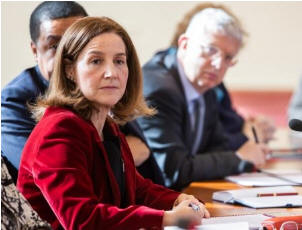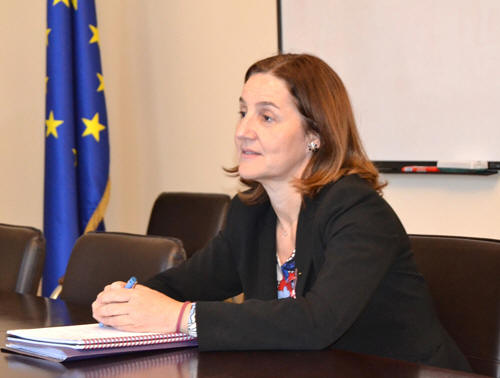
MOLDOVA'S PARTNERSHIP WITH
THE IMF: NEW OPPORTUNITIES
Clara Mira is the new IMF Mission Chief for the Republic of
Moldova, replacing Ruben Atoyan. Ms. Mira kindly agreed to give
an interview to the Weekly Economic Review "Logos-Press",
talking about the new opportunities for Moldova in partnership
with the IMF.
Ms. Mira, could you tell us a bit about your background?
I am originally from Spain and have been
working at the IMF for over 15 years. I started my career at the
Fund at the Executive Board, advising the Executive Director in
Spain’s constituency, and later moved to the African Department.
Most recently, I was Resident Representative in Uganda, and
mission chief for Guinea. Before joining the IMF, I worked for
the European Commission and the Central Bank of Spain.
Since December 2021, IMF program
commitments are edging closer to a record-breaking total amount
of $1 billion, how do you think the government should use the
IMF financial support?
This large amount includes the 2021 SDR
allocation (SDR 165m, or about $236m at the time), which was
rightly used to cushion the impact of the covid-19 pandemic. As
for the ECF/EFF program, Moldova’s current IMF program was
approved in December 2021, and augmented in May 2022, to provide
additional resources to Moldova to deal with the severe impact
of the war in Ukraine and the overlapping crises–energy crises,
trade disruptions, adverse confidence effects, inflow of
refugees.

The disbursements under the program are
intended to help Moldova meet balance of payments financing
needs arising from these shocks and protect social cohesion.
More specifically, most of the resources will be used for budget
support, and therefore in line with the government’s approved
budget, which in 2023 rightly focuses on mitigating the severe
social and economic effects of the war in neighboring Ukraine
and the impact of the energy shock. Once the pressures from the
energy and cost-of-living crisis subside, the key priorities
should turn to supporting the recovery and thus reinvigorating
growth.
In a very challenging environment, it is
impressive to see that program performance remains strong. The
authorities deserve praise for their commitment to implement a
package of sound macroeconomic policies and far-reaching
structural reforms meant to fortify the rule of law, reduce
corruption, and improve fiscal and financial management, in line
with our discussions and recommendations.
The authorities have also expressed
interest in financing under the Resilience and Sustainability
Facility (RSF) to address challenges posed by climate change.
On your last point, could you tell us
briefly about the Resilience and Sustainability Financing
Facility (RSF) that supplements the IMF's lending instruments?
The IMF is expanding its lending toolkit
to help member countries in new ways, and last year introduced
the RSF, a lending instrument that focuses on addressing
longer-term structural challenges, including those associated
with climate change. The RSF will provide affordable financing
and policy support to help build resilience to external shocks,
such as the adverse impacts of climate change, contributing to
countries’ sustainable growth and longer-term balance of
payments stability.
Should Moldova approach the IMF for
lending from the RST, what might be the requirements associated
with the RSF? Could you comment on the lending amount that could
be made available to Moldova through the RSF?
The Moldovan authorities expressed
initial interest in the RSF in December 2022 to help build
resilience against climate-related risks. Since then, we have
been working closely with the government and other development
partners to assess the key challenges and the state of
prospective reforms in this area. Three requirements must be met
before Moldova may access RSF resources. First, the country must
identify a set of high-quality reforms to address the
longer-term structural challenges associated with the adverse
impact of climate change. Second, Moldova needs to have an
underlying program with the IMF to run concurrently with the RSF
for at least 18 months. The current ECF-EFF program provides a
solid base for this requirement. Third, Moldova's debt should be
sustainable, and the country should have adequate capacity to
repay the Fund. Our most recent analyses show that indeed,
public debt in Moldova is sustainable and repayment capacity is
adequate. This means that most of the work that needs to be done
is related to identifying strong reform measures that can foster
lasting climate-positive institutional and policy changes.
Regarding the possible amounts, this
would need to be determined in future negotiations with the
authorities and approved by our Executive Board. However, the
starting point is a norm of 75 percent of a country’s quota, so
in Moldova’s case this would potentially be about $174 million
at the current exchange rate, contingent on the strength of the
reform measures.
Would the RSF, as it is the case with
the IMF lending, take the form of a concessional loan to the
country?
RSF loans combine low interest rates
with significantly longer maturities–up to 20 years–than
traditional IMF loans. There is a tiered interest structure that
differentiates financing terms across country groups, and
low-income members benefit from more concessional terms.
To what extent do the IMF share the
National Bank's fears of possible deflation, fraught with the
risk of the economy sliding into a deflationary spiral? What,
besides the easing of the National Bank's monetary policy,
should be done to prevent the concomitant contraction of the
inflation and the GDP?
The NBM’s proactive and decisive policy
response to contain inflation has been effective, and it is
paying off. Following a very pronounced spike and a peak of
nearly 35 percent in October 2022, inflation started to
decelerate, reaching 18.1 percent in April 2023. More recently,
we also see a firm downward trend of core inflation. In the
meantime, second-round effects have remained contained and
expectations well-anchored. The NBM’s strong response and
credibility, the more-contractionary-than expected fiscal
policy, and the more favorable global energy and food prices
contributed to this fast disinflation. As inflation is expected
to continue declining rapidly, the central bank has shifted to
easing its monetary policy stance in recent months. Going
forward, it would be important for NBM to continue its efforts
to bring inflation back to target, fine-tuning its response as
needed based on incoming data and revised projections. While
prospects bode well for NBM’s efforts, there is still
significant uncertainty, including due to the exceptionally
unpredictable evolution of energy prices. In our view,
controlling inflation is the best contribution a central bank
can make to maintain macroeconomic stability and protect the
most vulnerable in any country (as inflation is mostly a tax on
the poor).
The declining inflationary trend and
easing monetary policy are expected to stimulate domestic demand
(consumption and investment). Together with a fiscal stance that
is projected to be more expansionary than last year’s, we expect
to see a mild rebound in GDP growth in 2023.
On the background of Russia’s
military aggression against Ukraine, the energy crisis and other
challenges that Moldova has been facing, would the IMF’s revise
their condition on Moldova’s budget deficit?
Let me emphasize that the budget
deficit, like all the other program conditions, are decided
jointly with the authorities. The approved budget deficit of 6
percent of GDP for 2023 already incorporates the information
related to the impact of the overlapping challenges confronting
Moldova, including the war in Ukraine and the energy crisis. It
reflects policies to respond to the cost-of-living crisis and
ensure energy security, and new measures are planned to enhance
infrastructure investment and address capacity issues in the
civil service. Of course, targets could be adjusted through a
supplementary budget if the situation was to change
fundamentally. We are always prepared to consider policies that
better reflect the current reality and respond to the evolving
challenges, including for example, high inflation, while
maintaining appropriate buffers to safeguard against risks and
potential future shocks. Finally, it is important that the
deficit can be financed adequately and on reasonable terms.
What are your current impressions
about Moldova and what do you look forward to as mission Chief?
I am very excited about my new role as
mission chief for Moldova. I understand that over the years,
Moldova and the IMF have built a foundation of excellent
cooperation. I hope to continue this tradition by keeping an
open, frank and positive engagement and close working
relationships with the authorities. During my brief visit in
March, I experienced warm Moldovan hospitality, including
excellent food and wine! Chișinău is a beautiful city and I hope
to visit the rest of the country in the future. I believe
Moldova is a country of great potential because of its
advantageous location, tenacious citizens, forward-thinking
government, and prospects for EU accession. It is unfortunate
that the proximity to the war in Ukraine is having a strong
impact on Moldova’s economic and society. In this context, it is
very impressive that Moldova and its people have been welcoming
to tens of thousands of refugees from Ukraine. It also made me
very sad to learn that the population in Moldova has been
shrinking because of lack of opportunities for the youth; I
think creating opportunities and reigniting growth is a very
necessary priority. In my opinion, Moldova’s ongoing work to
improve its governance and boost its competitiveness will be
critical to ensure a better future for the Moldovan people.
Overall, I am excited to meet with Moldovan authorities,
policymakers, members of civil society, the business community,
and other stakeholders to hear their perspectives and better
understand the context, opportunities, and constraints. I look
forward to work alongside them to develop tailored solutions
that address the country's unique circumstances.
Thank you for the
interview!